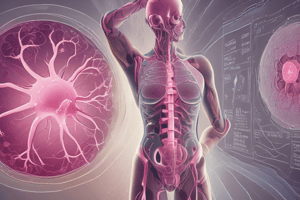Podcast
Questions and Answers
What type of mutation can affect the choice of cancer treatment?
What type of mutation can affect the choice of cancer treatment?
- KRAS mutation
- BRCA1 or BRCA2 (correct)
- TP53 mutation
- BRAF mutation
What is a potential limitation of combination therapy approach in cancer treatment?
What is a potential limitation of combination therapy approach in cancer treatment?
- Increased risk of disease recurrence
- Reduced quality of life
- Resistance to these treatments (correct)
- Higher cost of treatment
What is a potential side effect of chemotherapy?
What is a potential side effect of chemotherapy?
- Cardiovascular toxicity
- Hepatotoxicity
- Peripheral neuropathy (correct)
- Bone marrow suppression
What is a type of estrogen receptor modulator used in cancer treatment?
What is a type of estrogen receptor modulator used in cancer treatment?
What is a consequence of chemotherapy-resistance in cancer cells?
What is a consequence of chemotherapy-resistance in cancer cells?
What is a factor that affects the economic burden of metastatic breast cancer?
What is a factor that affects the economic burden of metastatic breast cancer?
What is the primary mechanism by which Betulinic Acid inhibits Topoisomerase I?
What is the primary mechanism by which Betulinic Acid inhibits Topoisomerase I?
Which of the following is a characteristic of Multidrug Resistant Tumors?
Which of the following is a characteristic of Multidrug Resistant Tumors?
What is the primary mechanism by which Taxol/Paclitaxel kills cancer cells?
What is the primary mechanism by which Taxol/Paclitaxel kills cancer cells?
What is the primary function of P-glycoprotein in Multidrug Resistant Tumors?
What is the primary function of P-glycoprotein in Multidrug Resistant Tumors?
What is the primary mechanism by which Antitubulin plant-derived drugs inhibit the growth of cancer cells?
What is the primary mechanism by which Antitubulin plant-derived drugs inhibit the growth of cancer cells?
What is the primary function of Topoisomerase I in cancer cells?
What is the primary function of Topoisomerase I in cancer cells?
The BRCA1 or BRCA2 mutation is a genetic factor that affects the choice of cancer treatment.
The BRCA1 or BRCA2 mutation is a genetic factor that affects the choice of cancer treatment.
The Foster et al. (2011) study focuses on the economic burden of metastatic breast cancer in developing countries.
The Foster et al. (2011) study focuses on the economic burden of metastatic breast cancer in developing countries.
Kolch and Pitt (2010) discuss the role of tyrosine kinase signalling pathways in cancer treatment.
Kolch and Pitt (2010) discuss the role of tyrosine kinase signalling pathways in cancer treatment.
The Starobova and Vetter (2017) study investigates the pathophysiology of chemotherapy-induced peripheral neuropathy.
The Starobova and Vetter (2017) study investigates the pathophysiology of chemotherapy-induced peripheral neuropathy.
The combination therapy approach is not associated with drug interactions.
The combination therapy approach is not associated with drug interactions.
Patel and Bihani (2018) discuss the role of selective estrogen receptor modulators (SERMs) in cancer treatment.
Patel and Bihani (2018) discuss the role of selective estrogen receptor modulators (SERMs) in cancer treatment.
The molecular mechanism of antitubulin plant-derived drugs involves the inhibition of Topoisomerase I.
The molecular mechanism of antitubulin plant-derived drugs involves the inhibition of Topoisomerase I.
P-glycoprotein is a protein involved in the development of multidrug resistance in cancer cells.
P-glycoprotein is a protein involved in the development of multidrug resistance in cancer cells.
Betulinic acid is a catalytic inhibitor of Topoisomerase I that enhances reactive oxygen species-mediated apoptotic Topoisomerase I-DNA cleavable complex formation in prostate cancer cells.
Betulinic acid is a catalytic inhibitor of Topoisomerase I that enhances reactive oxygen species-mediated apoptotic Topoisomerase I-DNA cleavable complex formation in prostate cancer cells.
Taxol/Paclitaxel kills cancer cells by inhibiting Topoisomerase I.
Taxol/Paclitaxel kills cancer cells by inhibiting Topoisomerase I.
Combination therapy approach is a strategy to overcome chemotherapy resistance in cancer treatment.
Combination therapy approach is a strategy to overcome chemotherapy resistance in cancer treatment.
DNA Topoisomerase I is an enzyme that relieves torsional stress in DNA by creating double-strand breaks.
DNA Topoisomerase I is an enzyme that relieves torsional stress in DNA by creating double-strand breaks.
Flashcards are hidden until you start studying
Study Notes
Cancer Treatment and Resistance
- Antitubulin plant-derived drugs, such as Taxol/paclitaxel, kill cancer cells by inhibiting microtubule dynamics.
- Combination therapy approaches, including modulation of P-glycoprotein through dietary nutraceuticals, can enhance the activity of anticancer drugs in multidrug-resistant tumors.
- Cancer drug resistance is an evolving paradigm, with treatment-resistant cells surviving due to various mechanisms, including genetic mutations and reactive oxygen species-mediated apoptosis.
Factors Affecting Treatment Choice
- Genetic factors, such as BRCA1 or BRCA2 mutations, can influence treatment decisions.
- Combination therapy approaches and drug interactions must be considered when selecting a treatment regimen.
- Patients' tolerance of side effects and the economic burden of treatment are also important factors to consider.
Side Effects and Resistance
- Chemotherapy-induced peripheral neuropathy is a common side effect of cancer treatment.
- Resistance to cancer treatments can occur due to various mechanisms, including topoisomerase I inhibition and reactive oxygen species-mediated apoptosis.
- Survival of treatment-resistant cells is a significant challenge in cancer treatment.
Molecular Mechanisms
- Betulinic acid, a catalytic inhibitor of topoisomerase I, inhibits reactive oxygen species-mediated apoptotic topoisomerase I-DNA cleavable complex formation in prostate cancer cells.
- DNA topoisomerase I inhibitors, such as camptothecin, work by inhibiting the religation step of the topoisomerase I reaction, leading to DNA damage and apoptosis.
- Antitubulin plant-derived drugs, such as Taxol/paclitaxel, bind to β-tubulin, inhibiting microtubule dynamics and leading to cell death.
Studying That Suits You
Use AI to generate personalized quizzes and flashcards to suit your learning preferences.




